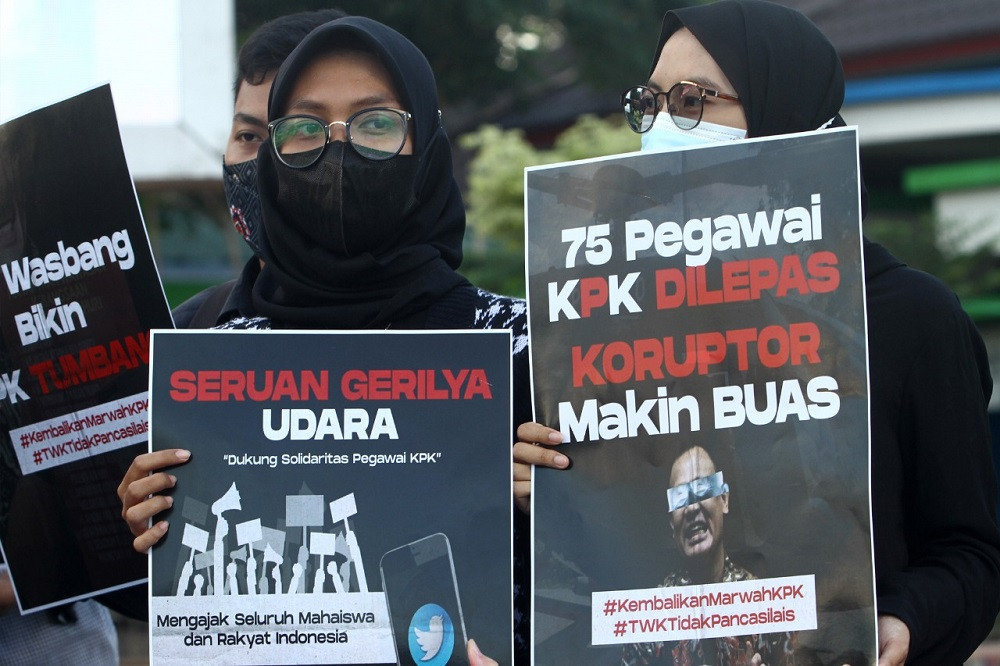Destroying the KPK, consolidating oligarchic power
It’s safe to say that the oligarchs are the main players behind attempts to defang the KPK.
Change Size

T
he weakening of the Corruption Eradication Commission (KPK) has entered a new phase. After the revision of the KPK Law, we are now witnessing the rising polemic surrounding the civic knowledge test (TWK), which many believe is a mechanism to remove certain “troublemakers” within the antigraft body.
The endless attempts to undermine the KPK evince that instead of facilitating democracy consolidation, the Reform Era actually resulted in the consolidation of oligarchies.
Early last month, the Constitutional Court (MK) turned down a judicial review filed against the revised KPK Law. We all remember that the revision of Law No. 30/2002 on the KPK went through a flawed process due to the absence of transparency and public consultancy.
The new Law No. 19/2019 strips the KPK of its authorities and independence. The systemic attempt to weaken the KPK coincided with the appointment of KPK leaders with questionable track records.
Data from Indonesia Corruption Watch (ICW) shows that maneuverings to undermine the KPK have been attempted many times. The weakening through the legislative process has been carried out since 2011, but to no avail due to strong public pressures.
Shortly after the Constitutional Court rejected the judicial review motion, controversy arose anew over the dismissal of 75 KPK employees who had not passed the TWK, as required by the KPK Law for them to gain civil service servant (ASN) status. Those who passed the test were installed on June 1, coinciding with the commemoration of Pancasila Day.
Corruption eradication was at the top of the reform agenda when the country embraced democracy in 1998. A number of legal products that support the corruption eradication agenda were issued, such as People’s Consultative Assembly (MPR) Decree No. XI/1998, Law No. 31/1999 on the eradication of corruption and Law No. 30/2002, which became the founding basis for the KPK. This is also the reason why the history of the KPK cannot be separated from the mandate of the reform movement.
However, the KPK, a product of reform, has now been subverted by the enormous forces whose vested interests have been thwarted by the KPK. It’s safe to say that the oligarchs are the main players behind attempts to defang the KPK.
Political scientist Jeffrey A. Winters defines oligarchs as actors who own and control a large concentration of material resources. These resources can be used to maintain or increase personal wealth and exclusive social position (wealth defense). The oligarchs are always individuals.
Meanwhile, oligarchy is a politics of wealth defense by actors who have material wealth.
The oligarchic agenda can be realized by hijacking procedural democracy, such as forming a political party and placing oneself at a powerful position (like the director of a company), placing pawns in strategic positions or even holding public office directly. All of this is done in order to produce policies that merit the oligarch’s interests.
A strong KPK is therefore a stumbling block for the will of the oligarchs to defend and increase their wealth. A weak KPK will facilitate their efforts.
Several months after the new KPK Law came into force, attempts to hijack democracy by the oligarchs continue. At least four legal products were passed in a similar pattern to the KPK Law revision. The legal products are the revision of Law No. 4/2009 on coal and mining, Law No. 4/2014 on the Constitutional Court, Government Regulation in Lieu of Acts No. 1/2020 on COVID-19 response and Law No. 11/2020 on job creation.
Like the new KPK Law, the four legal products were amended to benefit the oligarchs. The new Mining Law, for example, allows the oligarchs to extract natural resources in the long term. The government regulation for handling COVID-19 provides tax breaks for corporations. The Constitutional Court Law extended the terms of office of judges amid a lawsuit against the revision of the KPK Law. The Job Creation Law contains a number of articles that benefit corporations.
All of this happened as the civic space continues to shrink. Silencing citizens using Law No. 19/ 2016 on electronic information and transactions (ITE Law), violence against civil society activists, journalists and minority groups, dissolution of discussions at universities and digital surveillance that threatens citizens' privacy have been rampant across the country. Unsurprisingly, many believe post-reform democracy is no longer stagnant but is backsliding.
Meanwhile, demand for changes through procedural democracy is next to impossible due to the very strict requirements for establishing new political parties. Only people with abundant wealth can form political parties and participate in the race for offices. This procedural democracy makes it difficult for emerging powers to compete with the oligarchs.
The hijacking of the state by the oligarchs accompanied by the crisis of democracy shows that, instead of producing a consolidation of democracy, the reform era has actually resulted in the consolidation of the oligarchs. The reform agenda of eradicating corruption, fulfilling human rights, justice and democracy does not materialize.
More than 20 years after Reformasi (Reform Era), we learn that the oligarchs that used to thrive under the New Order have consolidated themselves. Pro-democracy groups have failed to stop them as they thought the reform was on track. The fact that the current political-economic structure is relatively unchanged from prior to Reformasi only proves that the reform has recreated an oligarchic political system.
The weakening of the KPK in particular and Indonesian democracy in general should trigger the opportunity to revisit the course of our democracy and the future of our reform agenda.
***
The writer is a researcher at Indonesia Corruption Watch.









